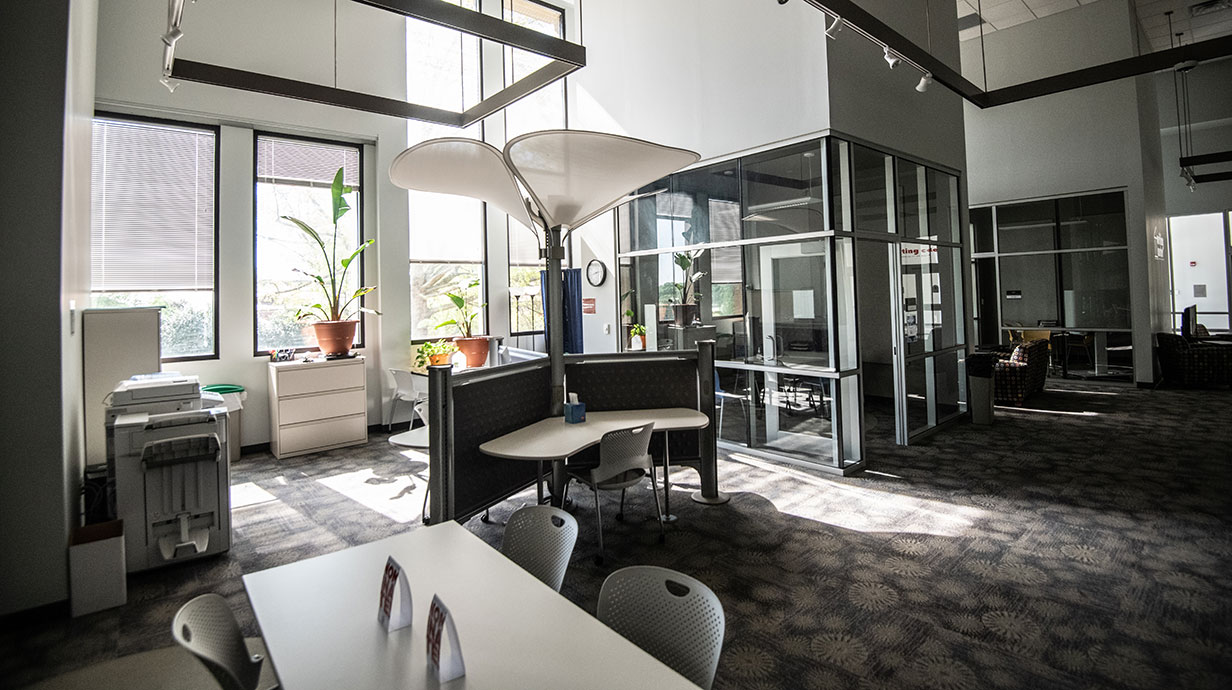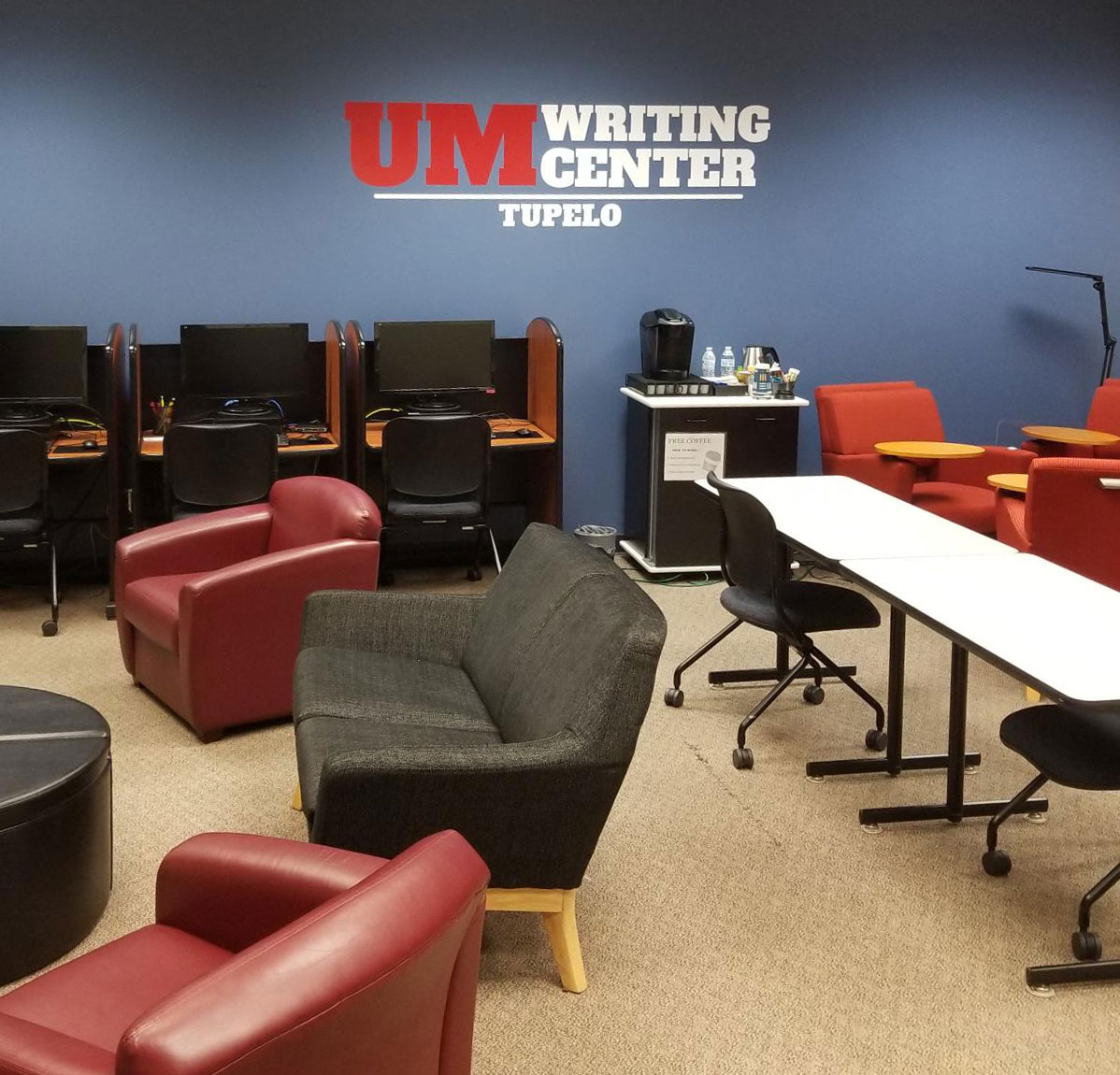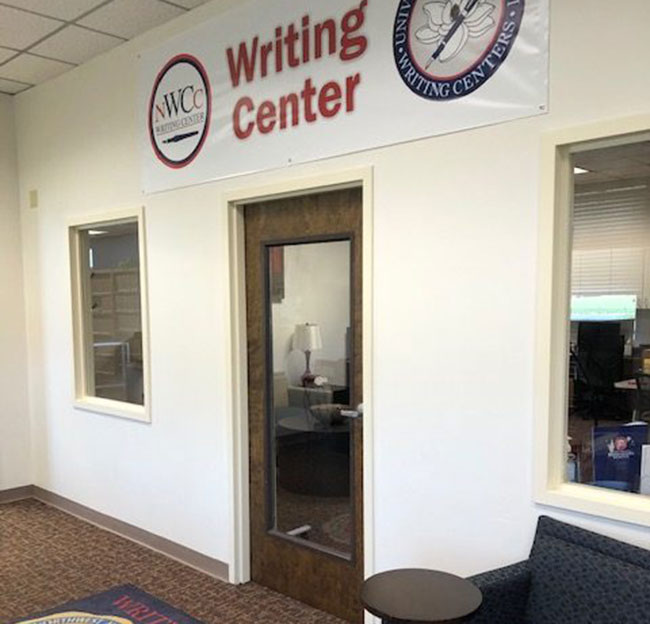Writing Centers
Learn more about our Oxford, Graduate, DeSoto & Tupelo Writing Centers
- Home
- Departmental Directory
- Liberal Arts
- Department of Writing and Rhetoric
- Writing Centers

Write with Confidence
We offer free writing consultation services for UM students. Our highly trained peer consultants work alongside UM students on projects in all disciplines at any stage of the composition process. Our centers provide access to free one on one consultations, group workshops, and other writing focused resources.
- Our services are delivered face to face and in online platforms through our multiple campus locations in Oxford, Tupelo, and Southaven.
- We work to help UM students cultivate individualized strategies for becoming independent, effective, and confident writers.
Learn more about our offerings for Graduate Students, and our regional campuses, Tupelo and DeSoto.
Hours and Availability
We have four different locations. Each center is generally open for quick questions and phone calls during normal business hours (8am-5pm), which is also when most of our appointments occur. There are variations in appointment availability on different days at different locations. Our centers operate on the University calendar and are closed for major holidays or breaks.
We are always happy to hear from you. If you have questions or need assistance, please feel free to call or email us. You can also follow us on social media to get regular updates, links to resources, and a little bit of writing humor.
Visit the Writing Centers
Locations & Contact Information
-
Oxford Writing Center
Visit the Oxford Writing Center on the third floor of Lamar Hall.
Lamar Hall, 3rd Floor, Suite C writingcenter@go.olemiss.edu @UMOxfordWC 662-915-7689 -
Graduate Writing Center
Visit the Graduate Writing Center around the corner from the Oxford Writing Center in Lamar Hall 321
Lamar Hall 321 gwc@olemiss.edu @UMGradWC 662-915-3173 -
DeSoto Writing Center
Visit the UM DeSoto Writing Center in the NWCC-DeSoto library
NWCC DeSoto Center, Library writingcenterdesoto@olemiss.edu @olemissdesotowc 662-280-6209 -
Tupelo Writing Center
Visit the Tupelo Writing Center in Room 261 of the Advanced Education Center
Advanced Education Center, Room 261 writingcentertupelo@olemiss.edu @UMTupeloWC 662-915-6259
Meet the Writing Centers Directors
Ellen Shelton
- Director UM Writing Project and Lecturer in Writing and Rhetoric and Interim Writing Center Director - Oxford
Claire Mischker
- Lecturer and Graduate Writing Center Director
Margaret Jeanine Rauch
- Senior Lecturer and Regional Campus Writing Center Director
Deidra Jackson
- Instructor and Regional Campus Writing Center Director
Graduate Writing Center
The goal of the Graduate Writing Center (GWC) is to provide free consultations to help graduate students produce successful academic writing by further developing effective writing skills. We encourage writers from any discipline or department to seek assistance with any stage of the writing process: from conception to composition to revision, from first to final draft. We are here to help writers develop strategies to improve their own writing. Remember that we will make suggestions concerning your writing, but you are responsible for making final authorial decisions (in conjunction with your director or committee, if applicable).
Graduate students should make appointments for writing consultations well in advance of an assignment due date or document deadline. Look out for announcements about workshops, writing groups, and boot camps specifically geared toward graduate student writing concerns. If you have an idea for a workshop or would like to start/participate in a writing group, please contact us.
Workshops
The Graduate Writing Center offers various workshops every semester, and specific workshops can be requested by faculty or organizations. Contact gwc@olemiss.edu to request a workshop.
Popular, recurring workshops include: APA, Professional Application Documents, Teaching and/or Diversity Philosophy Statements, General Writing Tips, and Endgame (for graduating students).
Our Services
We offer services for any assignment, including, but not limited to…
- Essays
- Lab Reports
- Term Papers
- Research Projects
- Case Studies
- Grant Proposals
- Theses and Dissertations
- Scholarly Articles
Graduate Writing Groups
The Graduate Writing Center coordinates Graduate Writing Groups (GWG). Groups usually meet weekly, based on member (and coordinator) availability. GWGs are student-led and based on peer review; they are not instructional. Group members are accountable for participation and providing the content for their meetings.
Our current GWG coordinator is Jack Russ, an alumnus of UM and now a graduate student in History.
If you are interested in joining a GWG, please email Jack at jdruss@go.olemiss.edu or gwc@olemiss.edu for more information.
Regional Students

Tupelo Writing Center
Whether you are an experienced writer or are just starting out, the Tupelo Writing Center is here to help! We provide free and effective consultations and resources that regional students need to progress as writers. Our trained consultants are ready to collaborate with you on any writing project you may be working on and at any stage of development. Regardless of whether you are brainstorming an essay, searching for peer-reviewed sources, or polishing your cover letter and resume, the Tupelo Writing Center can help provide the support you need to succeed!

DeSoto Writing Center
Regional students, we are in tune to your writing needs. Thanks to collaborations with your instructors, we can offer targeted support on specific writing assignments. We also are attentive to seasonal times of the semester when you need to submit resumes, cover letters or personal statements. Most importantly, we offer convenient appointments for your busy lives, when you also are working, maintaining important roles in family life, and active in your communities while earning college credit.
Types of Consultations
Please note: We take walk-in appointments when we can. If you want to be sure that you can have a specific appointment time, you can make a reservation easily through our online scheduler. We have two types of online appointments. You can choose whichever style fits your needs better.
You can stop by anytime during our hours of operation at one of our locations to talk with a consultant. You don’t have to have a full draft or be finished with a piece of writing to have a consultation. We work with any writer at any stage of the writing process. Stop in for a quick 15 minute conversation or stay for a full hour. It’s up to you!
Live Chat appointments are ideal for getting immediate feedback and answers to questions. You and your consultant will be able to communicate through video conferencing (or type messages in a chat box), share drafting materials, and make changes to a document together in real time. This type of appointment requires a consistent internet connection for the length of the appointment. Live chat appointments are best when conducted with a personal computer or laptop rather than a mobile device.
You’ll have several capabilities for communicating and working alongside your consultant.
- Our sessions are enabled for video, audio, and screen sharing. You’ll be able to talk directly with your consultant if you’d like. If the strength/speed of your Internet connection makes it difficult for you to use video conferencing, you can disable these functions and just use the written chat.
- In the center of the live chat dashboard, you’ll find a shared document space. Here, you can copy and paste portions of a document or add content that you’d like to share with your consultant. The document is color coded, which makes it easy to see who posted what. Your changes/additions will appear as one color and the consultant’s will be another.
- You may not be able (or may not want) to use the video conferencing feature. If so, you can use the written chat function to talk to your consultant and ask questions.
Correspondence appointments are asynchronous and ideal for getting feedback and answers to questions from a writing consultant over a longer period of time. You provide your draft along with information/requirements for a writing assignment prior to the reserved appointment time. About an hour after the reservation time, you will receive an email notification that your feedback has been uploaded. These appointments can be completed without a consistent internet connection. You can upload your paper from any wi-fi connection and return to our scheduler at a later time to download your written feedback.
What will the feedback on my writing look like?
The comments from your consultant will appear in the margins of your document. If you don’t see your comments immediately when you open the file in Microsoft Word, click on the View menu and select the Markup option.
How will I know when my feedback is available?
You will receive an automatic email notification when your consultant uploads their feedback. The subject line of the email will say New File Available and the sender will be University of Mississippi Writing Centers. Your file will be attached to the notification email. If you need to access your feedback file at a later time and can’t locate the email, you can always return to your appointment reservation on the scheduler to download it again.
Consultation Policies
Before your appointment with a writing center consultant on any campus or online, please review the following information and policies regarding appointments.
- Writing Process: Writing consultants assist with any type of writing in any discipline and at any phase of the writing process, from brainstorming and drafting to reviewing and polishing.
- Collaboration: Writing consultants will work alongside students to address important writing concerns, learn new skills and strategies, as well as access helpful resources, but they will not simply proofread or edit papers for students.
- Conduct: Students should behave in a professional and courteous manner both in person and online. Anyone who violates this may have their Writing Center privileges revoked. Consultants may end or leave sessions if a student is violating our policies or the UM Creed. Students must be wearing appropriate attire when participating in online appointments. Students should dress in a manner that would be considered appropriate to attend class.
- Number of Reservations: Students can schedule up to 2 appointments per day and 3 appointments per week. Students may elect to have a 30 minute or 1 hour face to face appointment. All online appointments are scheduled in 1 hour blocks.
- Longer Writing Projects: Due to time constraints and the high volume of appointments, consultants may not be able to review an entire draft of a paper if it exceeds 1500-2000 words (about 5 double spaced pages). If you are working on a longer writing project, you should plan to make multiple appointments and to point out specific areas of concern that you would like the consultant to prioritize in their review.
- Scheduling/Staffing: Occasionally, administrators may need to adjust appointments to accommodate change in consultants’ schedules. We reserve the right to reassign a consultation/appointment to another staff member working at the same time without notice. However, we will not change the time or date of an appointment without first reaching out and making alternate arrangements with a student-client.
- The Writing Center cultivates an environment that promotes inclusion, integrity, and safety. We ask that you respect all writing consultants and observe professionalism at all times when speaking with consultants about your work.
- Harassment of any kind will result in a suspension of Writing Center privileges and/or the filing of a report with relevant University of Mississippi offices, including the Title IX Office, the Office of Academic Integrity, the UM Police Department, and the Dean of Students Office.
- We understand that using the Writing Center may result in the formation of friendships between peers and we think that’s great. However, it is our policy that writing consultants not share their personal contact information with student clients when working in an official capacity at the center. Personal contact information may include personal email addresses, social media account information, personal phone numbers, or other personal contact information.
- Students should be actively engaged during Writing Center appointments since the goal for appointments is to think critically and reflectively about writing assignments and to actively consider changes that may improve the rhetorical effectiveness of students’ work.
- Asking a writing consultant to write part of a paper (or an entire paper), to participate in acts of deception regarding the authenticity of a piece of writing, or to knowingly participate in misleading a faculty member or another tutor will result in immediate suspension of Writing Center privileges and the submission of a report to the Academic Integrity Office. A breach of academic integrity, under any and all circumstances, will not be tolerated.
- Students can only make appointments for their own writing projects. Students cannot reserve appointments on behalf of other people (friends or family). Students can make appointments in groups for collaborative projects or designate a group leader to visit the Writing Center on behalf of the group. Please contact the WC director on your campus for more information about services for collaborative writing projects.
- Students may request that an appointment verification email be sent to their instructor. These verification emails are always sent directly to the instructor’s official email and will not be provided to the student in writing/hard copy. Students can access and view their own reports/activity with the Writing Center by logging into their scheduler account.
Request a Classroom Visit or Workshop
Join Our Team
Learn how you may qualify to become an Oxford consultant.
Do you like talking to your peers about their research and writing? Are you looking for a fun, flexible on campus job?
The Writing Center hires talented undergraduate UM students who are organized, dependable, and friendly to work collaboratively with peers to develop writing skills and processes. We are a diverse, close-knit staff. Our consultants come from many different disciplines and majors across the University of Mississippi community. We value multiple perspectives on writing from different academic fields and encourage students from any program to join us. At the Writing Center, you can gain valuable professional experience and take advantage of opportunities to research, travel, and network with other writers across the country. We’d be happy to have you join our team!
The Writing Center is committed to enriching educational experiences for students through the diversity of its staff. We encourage persons of all genders, persons of color, and persons with disabilities to apply.
While no previous experience is necessary, all members of the Oxford Writing Center staff complete a three-credit hour training course (WRIT 301: Responding to Writers) before they begin working with students. This course prepares you to work with writers by allowing you to explore the field of writing studies with a specific focus on current research and practice in peer collaboration and individualized instruction in writing. Students apply course concepts to real-world scenarios, learn and practice using technologies and platforms for writing consultation, reflect on their own values and understanding of writing, and intern/shadow at the Writing Center. The course is offered fully online in both the full summer and fall terms. You can register for the course through myOleMiss without special permission. While successful completion of the course is required for employment at the Center, it does not guarantee an offer of employment. Consultants must also demonstrate commitment to professionalism and a high level of personal integrity and respect for others.
Attend an upcoming interest meeting! These sessions (hosted by the director) will cover information about how to join the undergraduate consulting staff. There will be a brief Q&A and a chance to talk with current writing consultants about their experiences. All are welcome!
Register: TBD
Don’t see a meeting coming up that you can attend? Fill out this interest form and a member of our staff will contact you.
Writing Center Consultant – Interest Form
Our Mission & Values
Our mission is to facilitate the growth and development of University of Mississippi students as dynamic writers and thinkers by providing collaborative, student centered services and spaces.
Our highly trained peer consultants work alongside UM students on projects in all disciplines at any stage of the composition process through free one on one consultations, group workshops, and other writing focused resources. Our services are offered face to face and in online platforms through our multiple campus locations. We work to help students cultivate strategies to become independent, effective, and confident writers.
In pursuing our mission, we are guided by our commitment to:
- providing a space for critical inquiry and intellectual creativity outside of the classroom
- advocating for diversity and inclusiveness in our centers and on campus
- fostering individual and academic integrity
- advancing digital literacies and supporting multiple genres of writing
- partnering with faculty to promote excellence in student writing and composition
